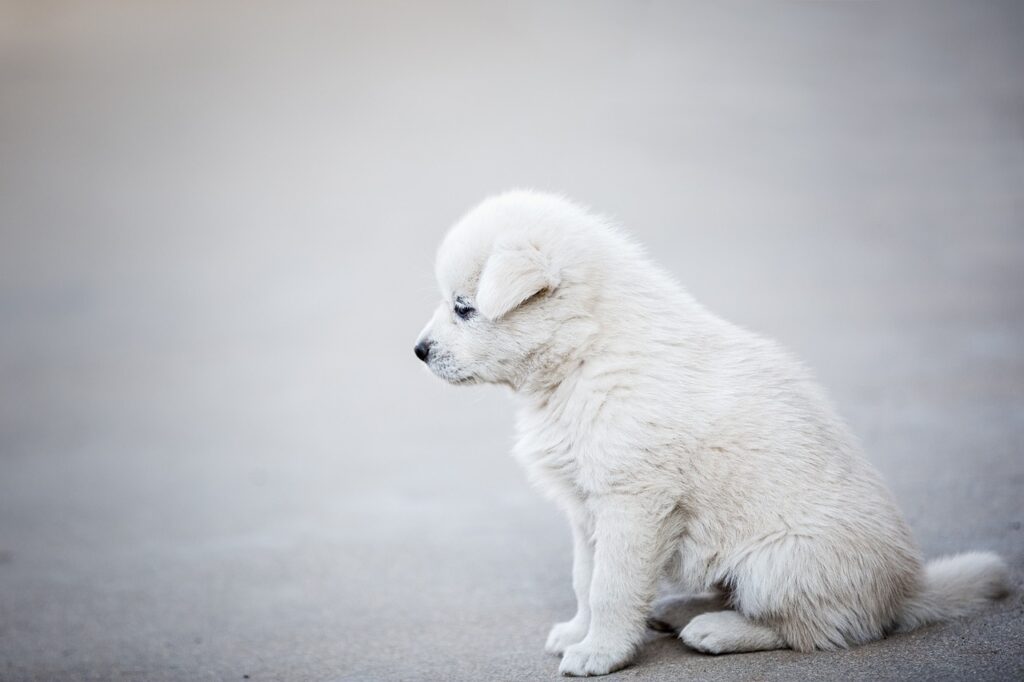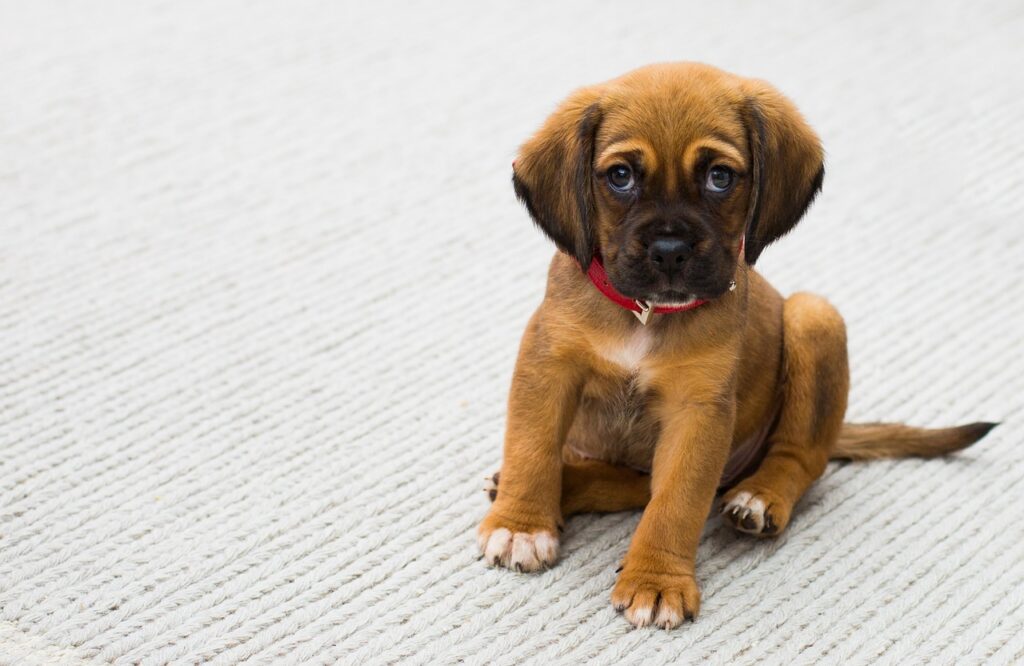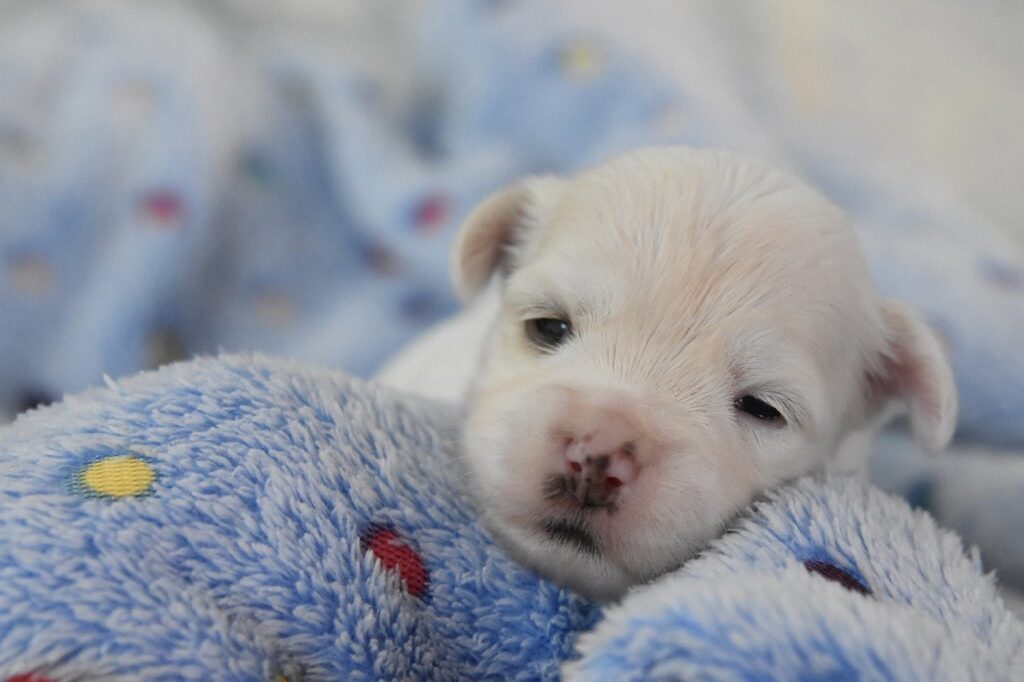Most puppies open their eyes between the ages of 10 and 14 days. However, breed-specific variations may exist.
Puppies keep their eyes closed for the first week of their lives. Their puppies eyes gradually open during the second week, typically between the ages of 10 and 16 days. They won’t initially be able to see well, though. The puppies eyes open will show hazy colors that are grayish-blue in tone. Their eyes will continue to develop over the coming weeks, and at about eight weeks of age, they will be able to see fully.
Puppies’ ears also start to open at the same time as their eyes, usually between the ages of 12 and 14 days. Until they are about five weeks old, their hearing continues to develop. Newborn puppies open eyes still rely heavily on their mothers for care and feeding during this time. As they become stronger and more physically capable, they will gradually learn to play, explore, and interact with other members of the household as well as their littermates.
Do not forget to handle young puppies eyes open gently during this important stage of development!
How Your Puppy’s Eyes Develop
Due to their undeveloped eyes, puppies are born with their eyelids closed. Their eyes are closed for the first week of life to shield them from dust and intense light. But at 10 to 14 days old, puppies eyes begin to slowly open, revealing their still-developing eyeball. The iris, or colored part of the eyeball, is what gives the eye its bluish to grey appearance at 14 days of age.
Additionally, the cornea might seem transparent or hazy. The iris typically acquires its adult color by eight weeks of age, and the cornea clears up. Puppies can only see movement and shapes when they first open their eyes, but over the next few weeks, their vision gets much better. A puppy’s vision should be as sharp as an adult dog’s by the time it is eight weeks old.
You can test a puppy’s vision by quietly throwing cotton balls into the air and watching how the puppy reacts visually. A typical puppies eyes open should track the cotton ball’s descent to the ground, watch it travel through the air, and obey the hand motion. To make sure when puppies eyes open reacts to visual cues rather than noise, it is imperative that you make no sound at all during this test.
Dogs can perceive shades of certain colors, despite the common misconception that they can only see in black and white. It is believed that dogs can see blue, yellow, green, and greyish brown hues. Dogs are better at spotting movement in low light than humans are at fine details. Therefore, even as their eyes grow, your puppy is getting ready to explore the vibrant world around them!


How to spot a problem with a newborn puppy’s eyes?
It is critical for the health of newborn puppies to identify any eyes open issues.
Observe the following warning signs:-
1. Swelling or discharge:- Pus or discharge from a puppies eyes, open along with swelling, may be signs of an infection. Timely veterinary care is essential to avoid complications.
2. Corneal Scratches:- Trauma can cause puppies’ corneas to scratch. Keep an eye out for symptoms like holding your eyes closed, squinting, or excessive tearing. Corneal scratches can be diagnosed and treated by a veterinarian.
Congenital Defects:- Eye defects may occur in some puppies at birth. These may consist of:
Missing Eye:- A puppy may be born without one eye or with a very small eye.
Choroidal Hypoplasia:- This condition involves underdeveloped layers of the eye and is commonly seen in collies.
Detached Retina:- A serious issue that requires veterinary care.
Juvenile Cataracts:- Clouding of the lens, which affects vision.
See a veterinarian right away if you think there may be any congenital defects.
Remember that the key to ensuring healthy eyes in newborn puppies is early detection and professional care!
Why Do Puppies Wait to Open Their Eyes?
Due to their undeveloped eyes at birth, puppies are born with their eyes closed. Their eyes are closed for the first week of life to shield them from dust and intense light. But at 10 to 14 days old, puppies open eyes and their eyelids begin to slowly open, revealing their still-developing eyeball.
Puppies eyes open continue to grow over the course of the following two weeks, making sure they are shielded from any outside elements that might be harmful. Puppies’ eyesight doesn’t fully develop until around 7 weeks of age, even after puppies open their eyes. As they go from a world of darkness to one full of sights and colors, it’s an amazing process!


when do puppies start walking and open their eyes?
Around the following times, puppies usually reach two important developmental milestones:-
1. Puppies open Their Eyes:-
o Infants to Four Weeks Old:- Puppies do not have senses during the first three weeks of life. They are blind, deaf, and smell. But, puppies eyes start to open at two to four weeks, enabling them to see their surroundings. They will be able to see well by four weeks, and they might even begin to wag their tails and bark.
o Take note:- Puppies eyes open look hazy and grayish-blue at first.
2. Starting to Walk:-
Most puppies start to take their first unsteady steps between 10 and 14 days of age. Their leg muscles get stronger as they progressively investigate their environment. They still move erratically, though, at this point.
Puppies can interact with their mother and littermates and walk more confidently by the time they are three or four weeks old. They grow more gregarious and inquisitive
Recall that every puppy develops differently, and there might be some variances. In these formative years, proper handling, socialization, and care are essential to their healthy development and wellbeing!


What are some other developmental milestones for puppies?
The following are some significant puppy developmental milestones:-
1. Teething:- Puppies begin to appear between 3 to 4 months of age. They will chew on different items to ease their discomfort while their baby teeth fall out and their adult teeth erupt during this period. Giving them suitable chew toys can assist in changing the direction of their chewing.
2. Socialization:- Puppies go through a crucial socialization phase between the ages of 3 and 14 weeks. During this time, it’s critical to expose them to a variety of people, animals, sounds, and environments. Good experiences mold their conduct and lessen anxiety in later life.
3. Housebreaking:- Puppies gain control over their bowel and bladder movements. A regular schedule and constant training are essential for a successful break-in. A puppy that is three months old can hold it for roughly three hours. Most puppies can hold it for an hour per month of age.
4. Basic Commands:- Puppies can learn basic commands like “come,” “stay,” and “sit” between the ages of three and six months. Training based on positive reinforcement is effective at this stage.
5. Fear Periods:- Around 8 to 11 weeks and again at 6 to 14 months, puppies may go through fear periods. They might start to act more wary or nervous during these periods. It’s crucial to be patient and to gently reassure them.
6. Physical Growth:- During the first few months of life, puppies open eyes and grow quickly. They put on muscle, put on weight, and their bones get stronger. A healthy diet is essential during this stage.
7. Adolescence:- Puppies reach adolescence between the ages of 6 and 18 months. They might push boundaries, grow more self-reliant, and go through hormonal shifts. Patience and consistent training are crucial during this occasionally difficult stage.
8. Complete Vaccination Schedule:- To ward off illnesses, puppies are given a series of vaccinations. For information on the proper vaccination schedule, speak with your veterinarian.
9. Spaying or Neutering:- Spaying (for females) or neutering (for males) usually takes place between 6 and 9 months, depending on the advice of your veterinarian. This provides health benefits and aids in the prevention of unintended pregnancies..
10. Adult Teeth:- By the time they are six months old, puppies have lost their baby teeth and grown a full set of adult teeth. Dental care must be received on a regular basis

